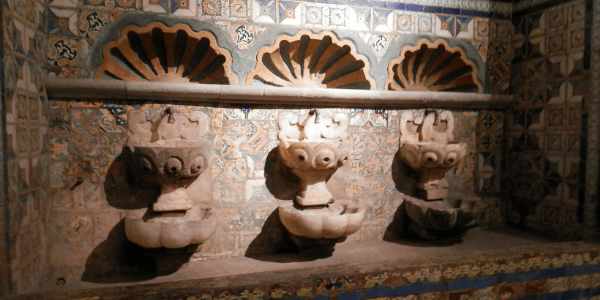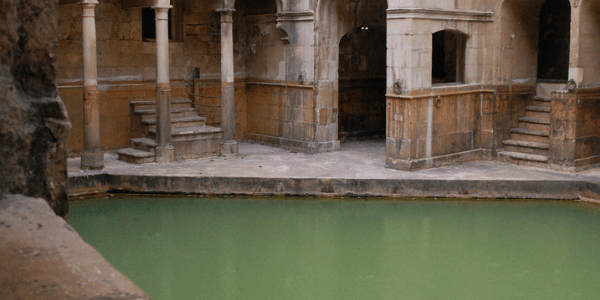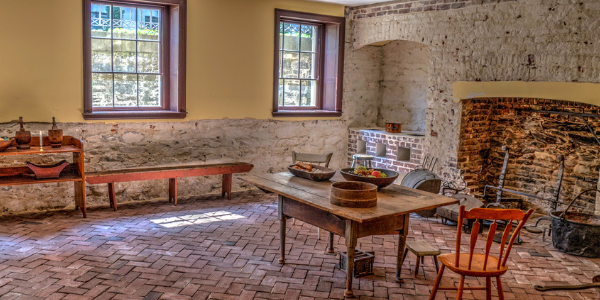
Facing down the barrel of global environmental collapse, we inevitably feel the pressure of figuring out how to change in response to resulting cultural and physical realities. One of the ways we are able to respond to the crises of climate change and global environmental degradation is to examine our daily rituals and how these rituals incorporate material wealth. At the very least, we have the ability to shift trends of materialism, to shift to sustainable and renewable resources, to a low-waste or no-waste lifestyles. Of course, this is never going to be enough in and of itself, and we must continue to place pressure on larger systemic practices that are polluting and extracting value from the land on a massive scale. But in the mean time, we have the power to delve into the realms of personal responsibility, devising and testing out new ways of living in order to envision new realities, providing ourselves and our communities with ways to move forward.
Related: Natural magick: Remembering our connection to the world by Chrysanthemum White Alder
As magical practitioners, we are well-versed in the process of interrogating core beliefs and reviving our practices, choosing better and more sustainable alternatives. Our practice is the practice of change. We challenge our core beliefs as a basic part of what we do. Therefore, tackling the minutiae of our everyday rituals is a great focus for magical practice. The things we do day to day have meaning, and we know that rituals have depth going beyond the surface level.
For example, we wash our hands in order to maintain a standard of sanitation, to prevent the spread of communicable disease, and ultimately, to cultivate health. Soap is a tool that we use to make this process more efficient. Is soap entirely necessary in order to properly cleanse our bodies? Sure, it helps after you use the washroom. It is necessary in some situations, like performing surgery or interacting with someone who has a compromised immune system. Soap is a great and useful tool. Yet, this tool can also be part of a system that has contraindications for the health and well-being of the individual.
Do you need to wash your hair everyday in order to be healthy, for example? Do you need a special face wash? Do you need to bleach your countertops? Where and when we draw the line in terms of hygiene tells us a lot about ourselves and our relationships, both to our bodies but also to a body of knowledge that is like a spell, creating an image of health and well-being that may or may not be in phase with the natural cycles of the Earth.
The natural body
On one level, it makes total sense to have systems that separate out waste products from sources of food. Waste can contaminate our food and this can make us sick. Thus, it also makes sense to have a visceral reaction to those same things. We shouldn’t put things in our mouths or on our bodies that may infect or poison us. This seems healthy and sensible on many levels.
Yet, where do we draw the line on what we find gross? There is a big difference between being grossed out by poop and being grossed out by body odour or naturally occurring oils on our skin. In different times and in different parts of the world, our relationships to our waste had us threading it back into the systems of production, using urine for a number of different processes (Ammonia) as well as fecal matter for use in agriculture (Night-soil). In this context, waste might be gross but it is also useful. In this context, you might immerse your hands in urine and that might be actually perfectly hygienic. (Through a lens beyond the ick factor)
The hows and whys of hygiene can deeply affect our relationship with our bodies, but not only to our bodies. This relationship can have deep implications for how we deal with our environment. How much we are grossed out by ourselves and the products of our bodies determines the amount of time and material we need in order to manage our bodies, and determines the ways in which we define and position ourselves around notions of purity.
So, how does this get practically applied? Firstly, we don’t need to use the amount of water that we do. Is it necessary or wise to flush our waste matter into our water systems, to spend the time and energy to then filter this same waste out of the water? This might be something that we want to think about on a systems level. On another level, we can think about how often we bathe and what we do when we bathe. How many products do we need in order to maintain our hygiene and when do we decide that we are clean enough?
The skin has natural protection that comes from beneficial bacteria and layers of fat and oils that naturally protect us from invaders from the outside world, keeping our bodies healthy. If we continually kill bacteria in a scorched earth methodology, we begin to impair our body’s ability to protect itself in the ways that it has evolved biologically. By approaching our bodies as though they are disgusting and that our physical reality is something that we must battle, we are going to develop unhealthy mentalities and energetic realities within our bodies.

I propose a kind of energetic form of bodily hygiene that focuses on reviving the energy of the body and investing in the health of the body, not as something that needs to be mediated, but rather, something that can be cultivated. Instead of attacking our little bacterial friends, we can offer them support, treating our bodies as a kind of lush farmland that can be nurtured into abundance.
Instead of using harsh chemicals of unknown origin, we can begin to take an active hand in creating substances that will support the natural function of our bodies. If we can get out of our own way, we can learn about how our bodies function and then act more like stewards. We don’t need to manage every little process, rather, we should step in when something is out of balance while generally allowing things to work in the way they do without interfering unnecessarily.
Environmental stewardship
In our homes, there is a very similar approach that can be taken towards cleanliness. We need not take a scorched earth approach to cleaning our homes and in the same way, we can instead apply a gentle approach to cleansing. In order to protect ourselves from illness, we probably should practice proper hygiene around high-risk activities, like meat preparation and the proper storage of food. This is to our benefit because this protects us from getting sick.
Related: Domestic magick: The lost art of homemaking by Chrysanthemum White Alder
Wiping down our countertops when they haven’t been in contact with meat or anything risky, does not really require anything more intensive than water. In my own home, I use water to clean. I don’t feel the need to use vinegar or lemon unless there is something really greasy on the surface of my counters or on my dishes. Water and movement are the essential elements of cleaning, requiring little more to accomplish most jobs. If you can begin to see yourself as a part of the world outside of you, not in conflict with it, you can begin to work in a harmonious way with your environment rather than against it.
If you can remove the matter from the surfaces of your dishes and counters, and if you avoid coming into contact with chemicals or other contaminants, your home will remain relatively clean. If you can remove unwanted matter from things, you are cleaning them because the process of eliminating bacteria is generally a kind of overkill. You can’t and don’t want to remove all bacteria from your life because it is in the removal of bacteria that we stop life from occurring. We need bacteria from the soil to get under our fingertips and in our mouths, we need the cycle to continue with and through our bodies. We cannot, nor should we, remove ourselves from the cycle of things.
What we should consider is, how contaminated are the spaces we live in? Which is more “dirty”, bacteria on the surface of a countertop, or the chemicals people spray on their lawn and on our vegetables? In my mind, things that are contaminated are dirty. Things that poison us are dirty. A bit of residue on my countertop can be dealt with through water and care. Contamination, on the other hand, is more difficult to separate and if you no longer have the concept of “away,” you are going to want to make sure that the waste products you are generating operate within the natural order.
What are you washing down your drain or mixing with your water? Is it poison? Are you participating in the contamination of the environment, because if you are, you are not “cleaning” your home so much as you are contaminating both it and the natural world.
To keep your house in tip-top shape, you have to run your hand over every surface of your home and you have to touch every object. To act as a steward of the eco-system of your home, you should be more concerned with making the energy more alive than in “killing” bacteria. In this way, you can cleanse by simply moving things around, by straightening up, by wiping things down with water or lemon, by getting rid of things that clutter up space or give you bad feelings. Your home is a living thing and it needs your care. It is not your enemy, but your friend, and if you work with it as a steward, you can both help your home to be a healthier and happier environment and also begin to do the reparative work to be a steward of the more than human world.

A spiritual return to the cycles
What is clean? What is pure? Our attitudes towards these things have deep spiritual roots. There are streams of thought that would make anything of the physical world impure and anything of a spiritual nature pure. There are yet other thoughts that would relegate the state of purity to civilization and call anything natural degraded. How you define purity and cleanliness is something that you can interrogate, and in so doing can contribute to a real and vital stand against environmental harm on a massive scale.
We have the opportunity to put our money where our mouths are. We can act as though everything is truly alive. We can act as though energy is real because we know that it is. But what does that mean? It might mean that we stop using chemicals in our homes because we understand that cleanliness is something that runs deeper than the fear of bacteria. We might begin to understand that we are one with the Earth and with our bodies, and that the products of these bodies are neither gross nor despicable but merely a part of a larger cycle. Our waste must be food for something else. That is the only way that we can live in harmony with the cycles.
As such, as lovers of the Earth and her ways, we must take ourselves to task in very real ways, to ask ourselves how we can live within the cycle, how we can make our waste into food for our non-human friends and how we can be stewards of the living world from within our very bodies, into our homes and finally in the world at large.
Rules for living
Moving forward, how is it that we can practically begin to live our spiritual realities? Following is a list of guidelines that I use in order to investigate my practices and try to move into alignment with the cycles of nature:
- What I produce must be food for something else.
- Stagnation creates disease; therefore, cleanliness comes from movement.
- Invest in life in all of your actions.
- Packaging is superfluous, avoid it.
- Be mindful of wealth usage (be ecologically thrifty).
- Avoid unnecessary consumption.
- Make, don’t buy.
- There is no “away.”
- Purity comes as a result of interdependence, not segregation.
- Don’t work against nature, but with it.
Conclusion
Spending differently is not going to be enough to initialize the paradigm shift required to halt the environmental catastrophe that we are faced with. We must shift the very foundation of the reality that we are participating within. We must interrogate our ideas of purity and goodness to place ourselves into alignment with the cyclical function of nature. In this way, we can live eternally, by shifting ourselves away from a kind of linear cultural progression into a culture that is in it for the long haul.
If we can do away with our attachment to linear progression, we can live amidst the cycles and in this way, our lives will be eternal. Death only exists when we live as though our lives exist on a line. There is no line except in our minds, and if we believe in this illusion our society too will die.
We have the potential to live in true abundance, to create golden ages that span across generations. It is within our power to transform our world. We have the magick to do it, now, we must simply find the will.
Image credits: MJoe2010, Bince, Roger Lancaster








